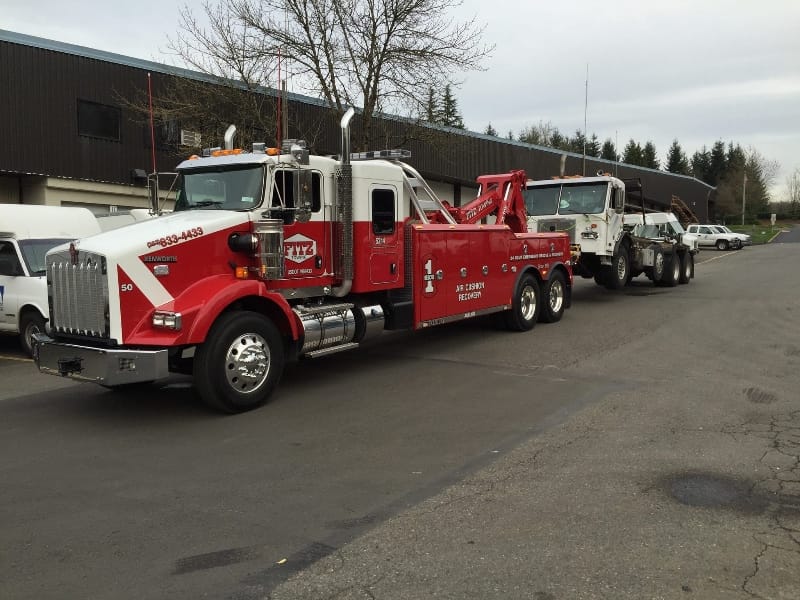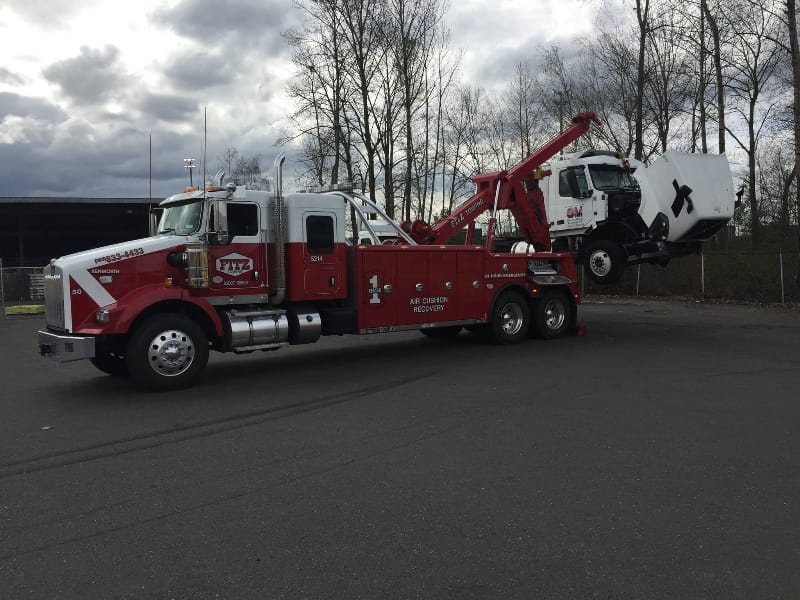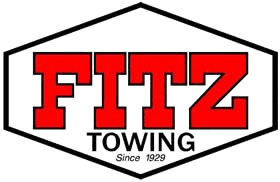Your Truck’s Limits Matter More Than You Might Think
We get it: towing can feel straightforward. Until it’s not. Whether you’re hauling a trailer for the first time or moving heavy equipment, there’s one number that should guide every decision you make: your towing capacity. It’s the difference between a smooth ride and a roadside disaster. At Fitz Towing, we’ve seen what happens when that number gets ignored, and trust us: it’s not pretty. Federal Way towing calls can easily come from situations that could’ve been avoided by simply knowing this limit.
Towing capacity tells you how much your vehicle can safely pull without damaging the engine, brakes, or suspension. Go beyond that, and things start breaking down—literally. Your vehicle strains harder, your stopping distance gets longer, and your tires wear out faster. That’s why understanding this one number is crucial for anyone towing anything heavier than a bike rack.

What Exactly Is Towing Capacity?
Let’s break it down. Towing capacity is the maximum weight your vehicle can tow while staying within the limits of its design. This number is set by the manufacturer and takes into account the frame strength, axle ratios, engine power, transmission, and braking system. Think of it as your vehicle’s safe operating zone.
But here’s the catch: this number assumes everything else is working in perfect condition: tires inflated, brakes working, weight evenly distributed. Once you start throwing in real-life variables like cargo weight and passenger load, your actual safe towing limit may drop. That’s why it’s smart to leave a buffer zone rather than riding the edge.
How Towing Capacity Is Calculated
It’s not a guess. Manufacturers do the math before stamping a capacity on your vehicle. Here’s how it typically comes together:
- Gross Vehicle Weight Rating (GVWR): The maximum your vehicle can weigh including passengers, cargo, and tongue weight.
- Gross Combined Weight Rating (GCWR): The total weight of your vehicle plus the trailer and its contents.
- Curb Weight: The empty weight of your vehicle.
- Payload: The combined weight of passengers and cargo inside the vehicle.
Towing Capacity = GCWR – Curb Weight
If your GCWR is 13,000 lbs and your truck weighs 6,000 lbs empty, that leaves 7,000 lbs for whatever you’re towing. But that’s assuming you’re not hauling four passengers, a bed full of tools, or towing uphill in 90-degree heat. Real-life conditions always shave that number down. Be smart and stay under.
Mistakes That Happen When You Ignore It
Towing more than your vehicle can handle is a gamble. Here’s what often goes wrong:
- Overheated engines from overexertion
- Transmission failure when gears are overworked
- Warped brakes that struggle to stop you in time
- Trailer sway that makes steering impossible
- Insurance denial if you’re found at fault during an overload accident
All of these can lead to costly repairs, or worse, a dangerous crash. Although our Federal Way towing team is happy to roll out and help, it’s not worth the risk.
Tips for Staying Within Safe Limits
Here’s how we keep our loads legal and safe:
- Check your owner’s manual for exact towing capacity.
- Subtract the weight of passengers and gear from your payload allowance.
- Weigh your trailer fully loaded, not just the trailer itself.
- Make sure your hitch matches the load you’re pulling.
- Watch your tongue weight. It should be 10-15% of your trailer’s total.
A little planning goes a long way. Don’t eyeball it.

Fitz Towing and Your Federal Way Towing Needs
At Fitz Towing, we’ve helped drivers all over with Federal Way towing that keeps things safe and simple. If you find yourself stuck because a trailer pushed your vehicle past its limits, we’re here to get you back on the road. Our team knows how to handle overloaded rigs, broken hitches, or trailers that just won’t budge. Our Federal Way towing service is always about getting it right.
Need help with a breakdown, recovery, or trailer transport? Call Fitz Towing for reliable Federal Way towing. We’ll get your vehicle where it needs to go, without adding to the damage. Know your towing capacity, but let us handle all your Federal Way towing needs.
FAQs
How do I find out how much my vehicle can tow?
Check your owner’s manual or the manufacturer’s sticker on the driver’s side door. This information includes your vehicle’s towing and payload ratings.
Why is it dangerous to tow more than the rated capacity?
Exceeding your vehicle’s towing limit can overheat the engine, damage the transmission, reduce braking ability, and increase the risk of losing control.
What’s the difference between dry weight and loaded weight?
Dry weight refers to a trailer’s weight without any cargo, fluids, or gear. Loaded weight includes everything in or on the trailer when it’s ready to tow.
Can I use a higher-rated hitch to increase towing capacity?
No. A stronger hitch doesn’t change your vehicle’s maximum towing capacity. Your limit is set by the weakest component in your towing setup.
Do I need a weight distribution hitch?
For heavier loads, yes. A weight distribution hitch helps balance the load between the tow vehicle and trailer, improving steering and braking.
How do I know if my trailer is properly balanced?
A properly balanced trailer will have 10–15% of its total weight on the tongue. Too little or too much tongue weight affects stability and handling.
Does towing impact fuel economy?
Yes, towing reduces fuel efficiency. The heavier the load and the more wind resistance from the trailer, the more fuel your vehicle will burn.
Can towing damage my transmission?
Yes, especially if your vehicle isn’t rated for heavy towing or if you skip regular maintenance. Using tow/haul mode and checking transmission fluid helps protect it.
